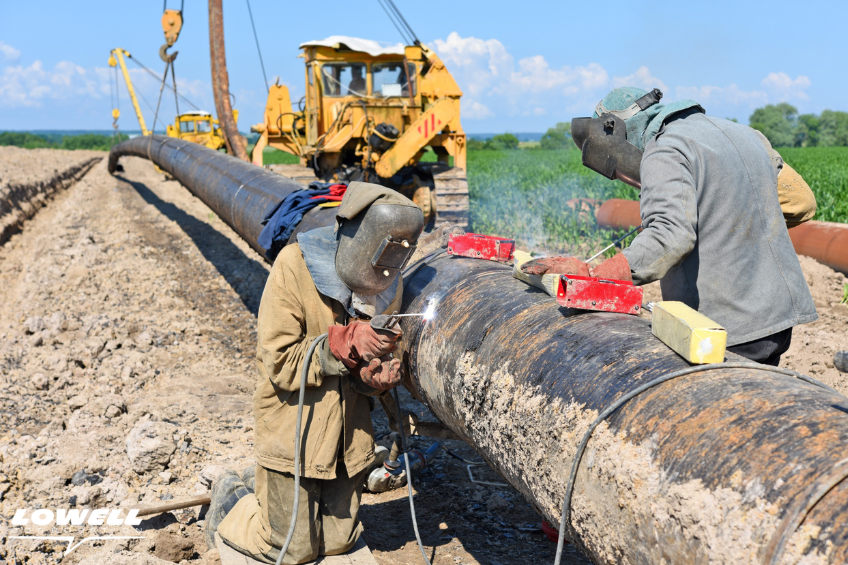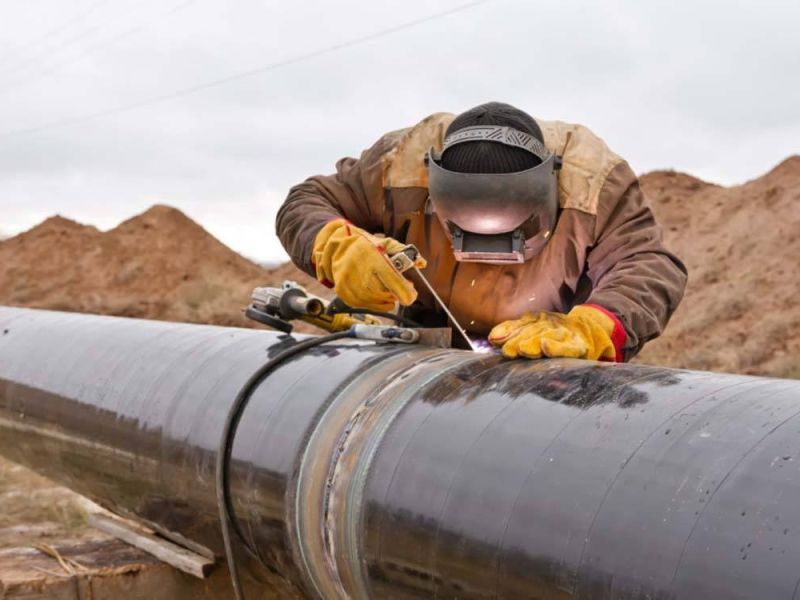Case Study: Creek Pipe Texas and the Impact of Real-Time Water Analytics
Wiki Article
A Comprehensive Overview to Recognizing Pipelines and Their Function in Construction
Pipes are essential parts in building, serving important functions in waste, gas, and water administration. Their selection and application can substantially affect a building's efficiency and safety. Numerous materials, such as PVC, copper, and PEX, provide distinct advantages fit to details needs (Creek Pipe Pipeline Construction). Recognizing these factors is vital for any building project. As one checks out the complexities of pipelines, the implications for conformity and public wellness become progressively noticeableThe Value of Pipes in Building
Pipelines offer as important channels in construction, promoting the movement of water, gas, and waste throughout structures and framework. Their duty expands beyond mere transportation; they are crucial for making certain the capability and security of business and residential environments. Effectively mounted pipes add to the effective distribution of sources, making it possible for everyday tasks such as heating, bathing, and cooking. Pipelines play an essential function in waste management, making sure that sewage and wastewater are efficiently eliminated from living spaces.The relevance of pipelines is likewise reflected in their influence on public health. Inadequate or defective piping systems can bring about contamination and harmful problems, making quality products and installment practices vital. Additionally, pipelines need to abide with numerous structure codes and regulations, which are developed to shield both occupants and the environment. The relevance of pipes in building and construction incorporates both practical capability and essential wellness considerations.Kinds of Water Lines Made Use Of in Building Jobs
Numerous kinds of pipelines play a substantial function in building jobs, each designed to meet specific demands and applications. Among one of the most frequently utilized pipe types are PVC, which is resistant and lightweight to deterioration, making it suitable for drain and vent systems. CPVC pipes, similar to PVC, can hold up against greater temperature levels, often utilized in hot water systems. Copper pipelines are recognized for their resilience and dependability, often used in pipes and home heating applications. Galvanized steel pipes, while much less usual today, were once a requirement for water lines as a result of their stamina. Furthermore, PEX (cross-linked polyethylene) pipes are acquiring popularity for property pipes due to their adaptability and resistance to scaling and chlorine. Cast iron pipelines are preferred for their sound-dampening residential or commercial properties, typically made use of in waste and soil systems. Each pipe kind offers distinct features, making certain efficient operation in building projects.Typical Products for Water Lines and Their Characteristic
In building, the option of pipeline materials is essential for making certain resilience and capability. Metal pipes use stamina and resistance to high pressures, while plastic pipelines supply corrosion-resistant and light-weight options. Composite pipes integrate the advantages of both materials, making them functional choices for different applications.Steel Pipeline Options
Steel pipes are integral elements in building and construction, offering an array of alternatives that accommodate environmental conditions and different applications. The most common materials include steel, copper, and cast iron. Steel pipelines are known for their stamina and sturdiness, making them ideal for high-pressure applications. Copper pipelines are preferred for their corrosion resistance and antimicrobial properties, usually made use of in plumbing systems. Cast iron pipelines supply superb noise insulation and are suitable for waste and drainage systems. Each metal kind has distinct advantages; for instance, galvanized steel can withstand rust, while stainless-steel supplies remarkable corrosion resistance. Picking the ideal steel pipe relies on aspects such as cost, ecological direct exposure, and the details needs of the building and construction project.
Plastic Pipeline Advantages
Plastic pipelines have obtained popularity in building and construction due to their light-weight nature and versatility. These pipelines, made from materials such as PVC, CPVC, and PE, deal outstanding resistance to corrosion and chemical damage, making them ideal for various applications. Their simplicity of installation additional enhances their charm, as they can be reduced and joined without special tools. In addition, plastic pipelines are usually extra affordable contrasted to steel choices, adding to reduced general task expenses. Their smooth indoor surface areas reduce friction and boost circulation rates, while insulation residential or commercial properties assist maintain temperature level control in plumbing systems - Creek Pipe Company. With a vast array of dimensions and setups readily available, plastic pipelines properly meet the varied requirements of modern-day building jobsComposite Pipeline Characteristics
Composite pipes combine different materials to take advantage of their individual toughness, causing boosted efficiency and sturdiness. Generally, these pipelines contain layers that may consist of steels, ceramics, and plastics, each adding unique homes. The internal layer may be made of a corrosion-resistant material, while the external layer provides stamina and effect resistance. This combination allows composite pipes to endure severe temperature levels and stress, making them appropriate for a large range of applications, including water system and industrial processes. Additionally, composite pipes are usually lighter than conventional materials, assisting in simpler handling and installment. Their convenience and adaptability to different settings make them a preferred option in contemporary construction projects, ensuring durability and efficiency in liquid transportation systems.Applications of Water Lines in Plumbing Equipments

Electrical Avenues: The Role of Piping in Circuitry
In contemporary building and construction, electric channels play an essential role in making certain the reliable and risk-free routing of electrical wiring throughout structures. These pipes offer a safety path for electrical cables, guarding them from physical damage and ecological elements. Different materials, such as PVC, metal, and flexible avenues, are utilized depending upon the certain requirements of the installation.Furthermore, conduits aid in organizing wiring systems, lowering the danger of electric dangers like short circuits or fires. They also facilitate easier upkeep and upgrades, as cords can be accessed and changed without substantial disruption to the structure.Proper installment of electrical conduits is essential for compliance with building ordinance and safety laws. This structured technique not just improves the durability of the electric system however additionally contributes to the total safety and security and capability of the building, making electrical avenues indispensable in modern-day construction methods.Picking the Right Pipe for Your Job
Just how can one guarantee the ideal pipe choice for a building task? The selection process starts with recognizing the particular needs of the task, including the kind of liquids being carried, stress rankings, and environmental conditions. Material choices, such as Copper, pvc, and steel, should be examined based upon sturdiness, corrosion resistance, and thermal properties.Next, one should think about the pipeline's diameter and circulation ability to ascertain efficient operation. Regulative criteria and codes have to likewise be abided by, as they determine the acceptable products and practices for particular applications. Consulting with experts and using substantial sources can better assist in making educated decisions.Finally, reviewing the cost-effectiveness of numerous options is important, balancing initial expenses with lasting upkeep and substitute prices - Creek Pipe Midland. By thoroughly evaluating these elements, one can with confidence choose one of the most appropriate pipeline for their building and construction task, ensuring both capability and conformity
Maintenance and Assessment of Pipeline in Building
Appropriate option of pipelines establishes the structure for their long-lasting performance, making maintenance and examination crucial elements in building and construction. Regular maintenance guarantees that any prospective problems, such as leaks, corrosion, or obstructions, are determined and dealt with immediately, lessening pricey repair work and project delays. Set up inspections, consisting of aesthetic analyses and pressure tests, play an important duty in examining the integrity of pipeline systems.Additionally, checking environmental factors, such as temperature level variations and dirt conditions, can aid prepare for deterioration. Using innovative technologies, such as CCTV for indoor assessments, can boost the effectiveness of maintenance initiatives. It is essential to record assessment findings and upkeep tasks to develop a complete background of the pipe systems. By focusing on maintenance and evaluation, construction professionals can prolong the life expectancy of their piping systems, ensuring they run effectively and accurately throughout the task's duration.Regularly Asked Concerns
Exactly How Do Pipes Affect Power Efficiency in Structures?
Pipelines significantly affect energy effectiveness in structures by regulating heating and cooling down systems. Appropriate insulation and materials decrease power loss, while efficient plumbing styles decrease water usage, inevitably bring about reduced power usage and functional costs.What Laws Govern Pipeline Setup in Building And Construction?
Regulations governing pipe setup in building generally consist of nationwide and regional structure codes, pipes codes, and security requirements. These warranty conformity with structural integrity, material specifications, and wellness needs, promoting security and effectiveness in building practices.Can Water Lines Be Recycled After Use?
The inquiry of pipe recyclability is significant. Many products, such as metal and certain plastics, can be reused efficiently. Nonetheless, the condition and sort of pipe impact recycling feasibility, demanding appropriate assessment before disposal.
How Do Climate Conditions Effect Pipe Performance?
Weather greatly influence pipe performance. Severe temperatures can cause expansion or contraction, while moisture might cause rust. In addition, hefty rainfall can boost soil pressure, impacting security and overall capability of the piping system.What Are the Indicators of Pipeline Failure to Look For?
Indications of pipe failure consist of leaks, uncommon noises, staining of water, reduced water stress, and visible deterioration. Routine inspections can assist discover these concerns early, guaranteeing and protecting against expensive repair services system functionality in the long-term. Pipes play an essential role in waste administration, making certain that sewer and wastewater are effectively eliminated from living spaces.The significance of pipes is likewise mirrored in their influence on public health. In building and construction, the selection of pipe materials is crucial for guaranteeing durability and performance. Steel pipelines use toughness and resistance to high pressures, while plastic pipes supply lightweight and corrosion-resistant options. Furthermore, Creek Pipe Midland pipelines are utilized to remove wastewater, linking bathrooms, sinks, and drains to local sewage systems or septic tanks.Different types of pipes, such as PVC, copper, and PEX, are picked based on aspects like toughness, expense, and certain application requirements. How can one assure the ideal pipe option for a construction project?Report this wiki page